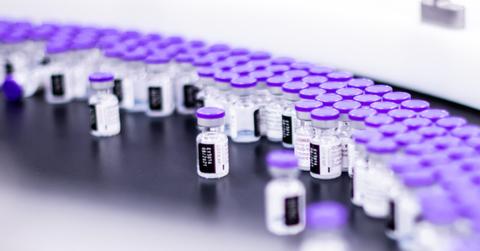Will Pfizer’s COVID-19 Vaccine Protect Against the Omicron Variant?
Pfizer CEO Albert Bourla seems confident that the company's COVID-19 vaccine and antiviral medication will be effective at protecting against the omicron variant.
Nov. 29 2021, Published 2:49 p.m. ET

Recently, it was brought to the public’s attention that a new variant of the COVID-19 virus has emerged, which prompted Pfizer and its partner BioNTech to question how strong their current vaccine is against it. Pfizer-BioNTech received authorization from the FDA to issue its COVID-19 vaccine for emergency use among children between the ages of 5 and 15.
Despite the advancements Pfizer has made with its vaccine and the COVID-19 treatment pill (Paxlovid) that it developed, the company is now presented with yet another challenge. Pfizer has to determine how effective its COVID-19 remedies are against the omicron variant of the COVID-19 virus.
Pfizer CEO Albert Bourla thinks that the company’s COVID-19 vaccine and pill will protect against the omicron variant.

Although the omicron variant hasn't been detected in the U.S. yet, health officials are concerned that it could potentially spread from one country to the next like the COVID-19 virus and its Delta variant did. The first cases of the omicron variant were identified in South Africa and have since been detected in other countries, including, but not limited to:
- Botswana
- Hong Kong
- Belgium
- Germany
- Italy
- Czech Republic
- Australia
- The U.K.
- Canada
All of the cases found in these countries reportedly were individuals who had arrived from South Africa, Mozambique, or Egypt.
Although the omicron variant has sparked fear and concern among individuals across the globe, President Joe Biden said that the omicron variant is “cause for concern, not a cause for panic.” Bourla doesn’t appear to be too worried either.
In a recent interview, Bourla said that he has “a very high level of confidence” that the company’s COVID-19 antiviral pill will be effective in protecting against the omicron variant.
When questioned how Pfizer’s COVID-19 vaccine would hold up against the omicron variant, Bourla stated, “The good news when it comes to our treatment, it was designed with that in mind, it was designed with the fact that most mutations are coming in the spikes.” Bourla confirmed that the company has already started working on a DNA template as of Nov. 26 for the omicron variant and will only use it if needed.
Pfizer could have a new vaccine for the omicron variant in as little as 100 days.
According to Pfizer's CEO, he and his team should know “most of the information that needs to be known within weeks” regarding the omicron variant. Once the omicron variant is studied and tested, Bourla suggested that if the current COVID-19 vaccine or antiviral medication isn’t as effective in protecting against the omicron variant as they’d like, a new vaccine could be made in as little as 100 days.
Pfizer claims that its antiviral medication used to treat COVID-19 symptoms is 89 percent effective at reducing hospitalization and death “when taken with a widely used HIV drug within three days of the start of symptoms.” The Pfizer-BioNTech vaccine is reportedly 95 percent effective at preventing infection among those who are fully vaccinated.
What is known about the omicron variant so far?
The World Health Organization (WHO) designated the omicron variant “a variant of concern” on Nov. 26. WHO made this decision as a result of evidence it received that indicated the variant might have “several mutations that may have an impact on how it behaves, for example, on how easily it spreads or the severity of illness it causes.”
Little is known regarding how easily the omicron variant can spread and how severe of a variant it is compared to the delta variant. However, WHO says that researchers in South Africa are gathering information on the omicron variant and sharing it as it becomes available.
For now, WHO says that it has preliminary evidence that suggests those who have already contracted the COVID-19 virus “could become reinfected more easily with Omicron.”
